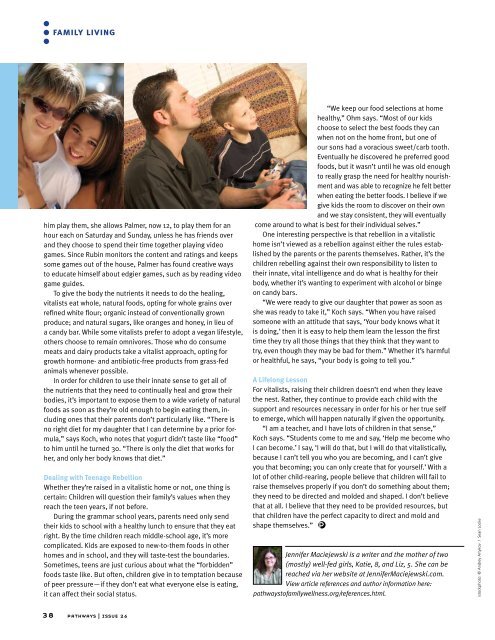Organic Foods: Know the Facts - Dr. Trent Maly
Organic Foods: Know the Facts - Dr. Trent Maly
Organic Foods: Know the Facts - Dr. Trent Maly
You also want an ePaper? Increase the reach of your titles
YUMPU automatically turns print PDFs into web optimized ePapers that Google loves.
family living<br />
him play <strong>the</strong>m, she allows Palmer, now 12, to play <strong>the</strong>m for an<br />
hour each on Saturday and Sunday, unless he has friends over<br />
and <strong>the</strong>y choose to spend <strong>the</strong>ir time toge<strong>the</strong>r playing video<br />
games. Since Rubin monitors <strong>the</strong> content and ratings and keeps<br />
some games out of <strong>the</strong> house, Palmer has found creative ways<br />
to educate himself about edgier games, such as by reading video<br />
game guides.<br />
To give <strong>the</strong> body <strong>the</strong> nutrients it needs to do <strong>the</strong> healing,<br />
vitalists eat whole, natural foods, opting for whole grains over<br />
refined white flour; organic instead of conventionally grown<br />
produce; and natural sugars, like oranges and honey, in lieu of<br />
a candy bar. While some vitalists prefer to adopt a vegan lifestyle,<br />
o<strong>the</strong>rs choose to remain omnivores. Those who do consume<br />
meats and dairy products take a vitalist approach, opting for<br />
growth hormone- and antibiotic-free products from grass-fed<br />
animals whenever possible.<br />
In order for children to use <strong>the</strong>ir innate sense to get all of<br />
<strong>the</strong> nutrients that <strong>the</strong>y need to continually heal and grow <strong>the</strong>ir<br />
bodies, it’s important to expose <strong>the</strong>m to a wide variety of natural<br />
foods as soon as <strong>the</strong>y’re old enough to begin eating <strong>the</strong>m, including<br />
ones that <strong>the</strong>ir parents don’t particularly like. “There is<br />
no right diet for my daughter that I can determine by a prior formula,”<br />
says Koch, who notes that yogurt didn’t taste like “food”<br />
to him until he turned 30. “There is only <strong>the</strong> diet that works for<br />
her, and only her body knows that diet.”<br />
Dealing with Teenage Rebellion<br />
Whe<strong>the</strong>r <strong>the</strong>y’re raised in a vitalistic home or not, one thing is<br />
certain: Children will question <strong>the</strong>ir family’s values when <strong>the</strong>y<br />
reach <strong>the</strong> teen years, if not before.<br />
During <strong>the</strong> grammar school years, parents need only send<br />
<strong>the</strong>ir kids to school with a healthy lunch to ensure that <strong>the</strong>y eat<br />
right. By <strong>the</strong> time children reach middle-school age, it’s more<br />
complicated. Kids are exposed to new-to-<strong>the</strong>m foods in o<strong>the</strong>r<br />
homes and in school, and <strong>the</strong>y will taste-test <strong>the</strong> boundaries.<br />
Sometimes, teens are just curious about what <strong>the</strong> “forbidden”<br />
foods taste like. But often, children give in to temptation because<br />
of peer pressure—if <strong>the</strong>y don’t eat what everyone else is eating,<br />
it can affect <strong>the</strong>ir social status.<br />
3 pathways | issue 26<br />
“We keep our food selections at home<br />
healthy,” Ohm says. “Most of our kids<br />
choose to select <strong>the</strong> best foods <strong>the</strong>y can<br />
when not on <strong>the</strong> home front, but one of<br />
our sons had a voracious sweet/carb tooth.<br />
Eventually he discovered he preferred good<br />
foods, but it wasn’t until he was old enough<br />
to really grasp <strong>the</strong> need for healthy nourishment<br />
and was able to recognize he felt better<br />
when eating <strong>the</strong> better foods. I believe if we<br />
give kids <strong>the</strong> room to discover on <strong>the</strong>ir own<br />
and we stay consistent, <strong>the</strong>y will eventually<br />
come around to what is best for <strong>the</strong>ir individual selves.”<br />
One interesting perspective is that rebellion in a vitalistic<br />
home isn’t viewed as a rebellion against ei<strong>the</strong>r <strong>the</strong> rules established<br />
by <strong>the</strong> parents or <strong>the</strong> parents <strong>the</strong>mselves. Ra<strong>the</strong>r, it’s <strong>the</strong><br />
children rebelling against <strong>the</strong>ir own responsibility to listen to<br />
<strong>the</strong>ir innate, vital intelligence and do what is healthy for <strong>the</strong>ir<br />
body, whe<strong>the</strong>r it’s wanting to experiment with alcohol or binge<br />
on candy bars.<br />
“We were ready to give our daughter that power as soon as<br />
she was ready to take it,” Koch says. “When you have raised<br />
someone with an attitude that says, ‘Your body knows what it<br />
is doing,’ <strong>the</strong>n it is easy to help <strong>the</strong>m learn <strong>the</strong> lesson <strong>the</strong> first<br />
time <strong>the</strong>y try all those things that <strong>the</strong>y think that <strong>the</strong>y want to<br />
try, even though <strong>the</strong>y may be bad for <strong>the</strong>m.” Whe<strong>the</strong>r it’s harmful<br />
or healthful, he says, “your body is going to tell you.”<br />
A Lifelong Lesson<br />
For vitalists, raising <strong>the</strong>ir children doesn’t end when <strong>the</strong>y leave<br />
<strong>the</strong> nest. Ra<strong>the</strong>r, <strong>the</strong>y continue to provide each child with <strong>the</strong><br />
support and resources necessary in order for his or her true self<br />
to emerge, which will happen naturally if given <strong>the</strong> opportunity.<br />
“I am a teacher, and I have lots of children in that sense,”<br />
Koch says. “Students come to me and say, ‘Help me become who<br />
I can become.’ I say, ‘I will do that, but I will do that vitalistically,<br />
because I can’t tell you who you are becoming, and I can’t give<br />
you that becoming; you can only create that for yourself.’ With a<br />
lot of o<strong>the</strong>r child-rearing, people believe that children will fail to<br />
raise <strong>the</strong>mselves properly if you don’t do something about <strong>the</strong>m;<br />
<strong>the</strong>y need to be directed and molded and shaped. I don’t believe<br />
that at all. I believe that <strong>the</strong>y need to be provided resources, but<br />
that children have <strong>the</strong> perfect capacity to direct and mold and<br />
shape <strong>the</strong>mselves.”<br />
Jennifer Maciejewski is a writer and <strong>the</strong> mo<strong>the</strong>r of two<br />
(mostly) well-fed girls, Katie, 8, and Liz, 5. She can be<br />
reached via her website at JenniferMaciejewski.com.<br />
View article references and author information here:<br />
pathwaystofamilywellness.org/references.html.<br />
istockphoto: © Andrey Artykov / Sean Locke


